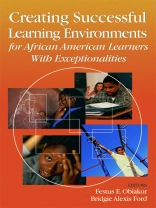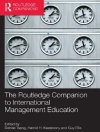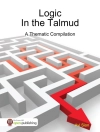Discover the key strategies to empowering African American students with exceptionalities!
Central to the teaching and learning of African American students is an understanding of their cultures, background experiences, and perspectives, while applying this understanding to the design, implementation, and assessment of educational programs. This comprehensive, culturally responsive approach is supported by straightforward and in-depth contributions from more than 25 leading scholars and practitioners featured in this book.
The guide focuses on specific, innovative methods for maximizing the learning opportunities and outcomes of African American students—from dealing with foundational issues such as accountability, categorization, and legal implications, to managing learning environments and enhancing school practices through teacher preparation and early childhood programs.
By providing concrete rationales and solutions for maximizing the intellectual, academic, and social achievement of African American learners, this groundbreaking text presents the tools necessary for meeting the needs of these students, including:
- Assessment and instructional techniques for general and special education programs, including discussions on specific learning disabilities
- Intervention tactics for behavioral issues
- Tips for utilizing family and community resources to complement the classroom
- Strategies for enhancing students′ communication skills and maximizing the potential of gifted and talented learners
Jadual kandungan
Foreword – Geneva Gay
Preface
About the Editors
About the Contributors
Part I: Foundations of Educational Change
1. School Accountability and Reform: Implications and African Americans With Exceptionalities – Festus E. Obiakor and Bridgie Alexis Ford
2. Legal Foundations of Special Education for African American Learners – Elizabeth A. Dooley and Katherine L. Dooley
3. Functionalizing Assessment for African American Learners in General and Special Education Programs – Cheryl A. Utley
4. Categorization: Impact on African American Learners With Exceptionalities – Angela Stephens Mc Intosh
Part II: Managing Learning Environments
5. Instructional Strategies for African American Learners With Cognitive Disabilities – Helen Bessant Byrd
6. Working With African American Students With Specific Learning Disabilities – Patrick A. Grant and Pauline B. Grant
7. Interventions for African American Learners With Behavioral Problems – Cathy Kea, Gwendolyn Cartledge, and Lisa J. Bowman
8. Maximizing the Learning Potential of African American Learners With Gifts and Talents – Vera I. Daniels
9. Communication Skills of African American Learners With Disabilities – Martha Scott Lue, Cheryl Evans Green, and Shelia Yvette Smalley
10. Developing Self-Empowerment in African American Learners With Special Problems – Festus E. Obiakor
Part III: Complementing the School Environment
11. Service Delivery for African American Young Children With Special Needs – Regina Enwefa and Stephen Enwefa
12. African American Families: Equal Partners in General and Special Education – Loretta P. Prater
13. African American Community Resources: Essential Educational Enhancers for African American Children and Youth – Bridgie Alexis Ford
14. Transitioning African American High School Students With Disabilities – Bertina H. Combes and Beth A. Durodoye
15. Teacher-Preparation for African American Exceptional Learners: A Cultural-Historical Approach – Stanley C. Trent
16. Culturally Responsive Leadership for African Americans With Exceptionalities – Darrell L. Williams, Christlyn Frederick-Stanley, and Adell Fair
17. Summary of Comments: Race, Class, Gender, and Exceptionality of African American Learners – Edgar G. Epps
Index
Mengenai Pengarang
Festus E. Obiakor, Ph.D., is the Chief Executive Manager, Sunny Educational Consulting, Shorewood, Wisconsin. He has served as Department Head and Professor, Valdosta State University, Valdosta, Georgia and The City College of New York, New York. A teacher, scholar, leader, and consultant, he has served as Distinguished Visiting Professor at a variety of universities. He is the author of more than 150 publications, including books, articles, and commentaries; and he has presented papers at many national and international conferences. He serves on the editorial boards of reputable nationally and internationally refereed journals, including Multicultural Learning and Teaching (MLT) in which he serves as Executive Editor. Dr. Obiakor is a leader who has been involved in many landmark scholarly works in the fields of general and special education, with particular focus on African American and other culturally and linguistically diverse (CLD) learners and he continues to prescribe multidimensional methods of assessment, teaching, and intervention for these individuals. Based on this premise, Dr. Obiakor created the Comprehensive Support Model (CSM), an intervention model that values the collaborative, consultative, and cooperative energies of students, families, teachers/service providers, communities, and government agencies.












